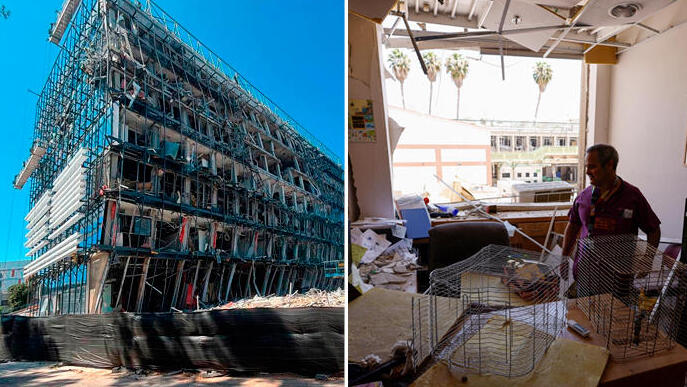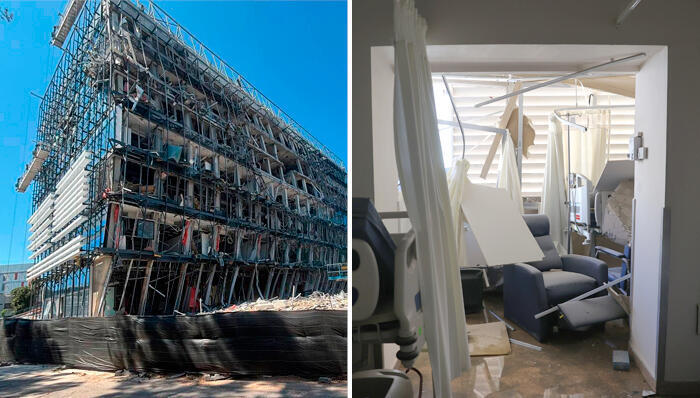
Missile strikes cause over $700M in damage at Weizmann Institute and Ben-Gurion University
More than 160 buildings damaged as Israel’s top research centers warn of stalled labs and outdated compensation rules.
Two buildings at the Weizmann Institute of Science, the Institute for Cancer Research and the Advanced Chemical Materials Research Building, were completely destroyed by two missiles that struck the campus. The Advanced Materials Research Building was nearing the end of its construction. This information was presented by Weizmann Institute President Prof. Alon Chen during a Knesset Finance Committee discussion on the damage sustained by the institute and other universities. The discussion was initiated by MKs Oded Forer and Hamad Amar from the Yisrael Beiteinu party.
In total, Prof. Chen told the committee, 112 buildings were damaged, including 60 laboratory buildings and 52 residential buildings. Five buildings require complete reconstruction, among them the Environmental Quality Laboratory. In total, 52 research laboratories and six service laboratories were destroyed. Between 20% to 25% of the institute’s activity has been halted. The estimated direct damage to buildings and equipment, excluding lost research knowledge and the cost of renting temporary laboratory space, ranges between 1.5 to 2 billion shekels (approximately $445M-593M).
Chen expressed concern over the way property tax compensation is calculated, warning that current methods are based on depreciated value rather than replacement cost. “If we bought a microscope for a scientist five years ago at a cost of $1 million, its book value today might be $200,000, but replacing it now could cost $1.3 to $1.5 million. If we only receive $200,000, who covers the rest?” He added that “there are many gray areas in the compensation system, and that’s the difference between receiving 500 million shekels and two billion shekels.”
Another issue he raised was the challenge of renting laboratory space in the science park adjacent to the institute. While such a move could restore operations in weeks or months, it would require a five-year lease that the institute cannot currently afford. He also noted that the Weizmann Institute admits 10–15 new researchers annually, raising the question of how to accommodate them if there is no lab space available.
Ben-Gurion University President Prof. Daniel Chamovitz estimated the damage to the university from the three missile strikes at NIS 200 to 400 million ($59M-$118M). Among other things, two floors of the Faculty of Medicine at Soroka Hospital were damaged, including cancer and Alzheimer’s research laboratories. The anatomy and dissection rooms (used for autopsies) were destroyed. The impact of a second missile damaged 40 buildings on campus, while a third missile destroyed the university’s sports center.
MK Oded Forer of Yisrael Beiteinu, one of the initiators of the discussion, said: “This is not a normal compensation case. The existing property tax procedures are not suitable for such an event.” Forer called for the appointment of a special project manager to oversee the recovery of the academic sector. MK Hamad Amar called for funding to allow damaged laboratories to continue operating in rented spaces. MK Naama Lazimi of the Labor Party called for a generous grant to help researchers restore their lost work. MK Meirav Cohen, also of Labor, said: “At Ben-Gurion, the plan is to finance only half of the reconstruction costs. Our taxes should ensure that everything is rebuilt better and stronger.” She also emphasized that new buildings should be constructed with improved protective measures.
The chairman of the committee, MK Moshe Gafni of United Torah Judaism, proposed establishing a special committee to handle extraordinary damage during the war. He demanded that the property tax authority respond to the Weizmann Institute’s request to fund laboratory rentals. MK Eli Dellal of Likud warned of a potential brain drain if researchers are left without functioning laboratories.
A representative from the property tax authority said: “It is too early to determine exact amounts, but we are very open-minded.” He noted that “unlike residential properties, where rent coverage is standard, for businesses this is classified as major damage.” Members of the Knesset criticized the classification of universities as businesses for compensation purposes.
